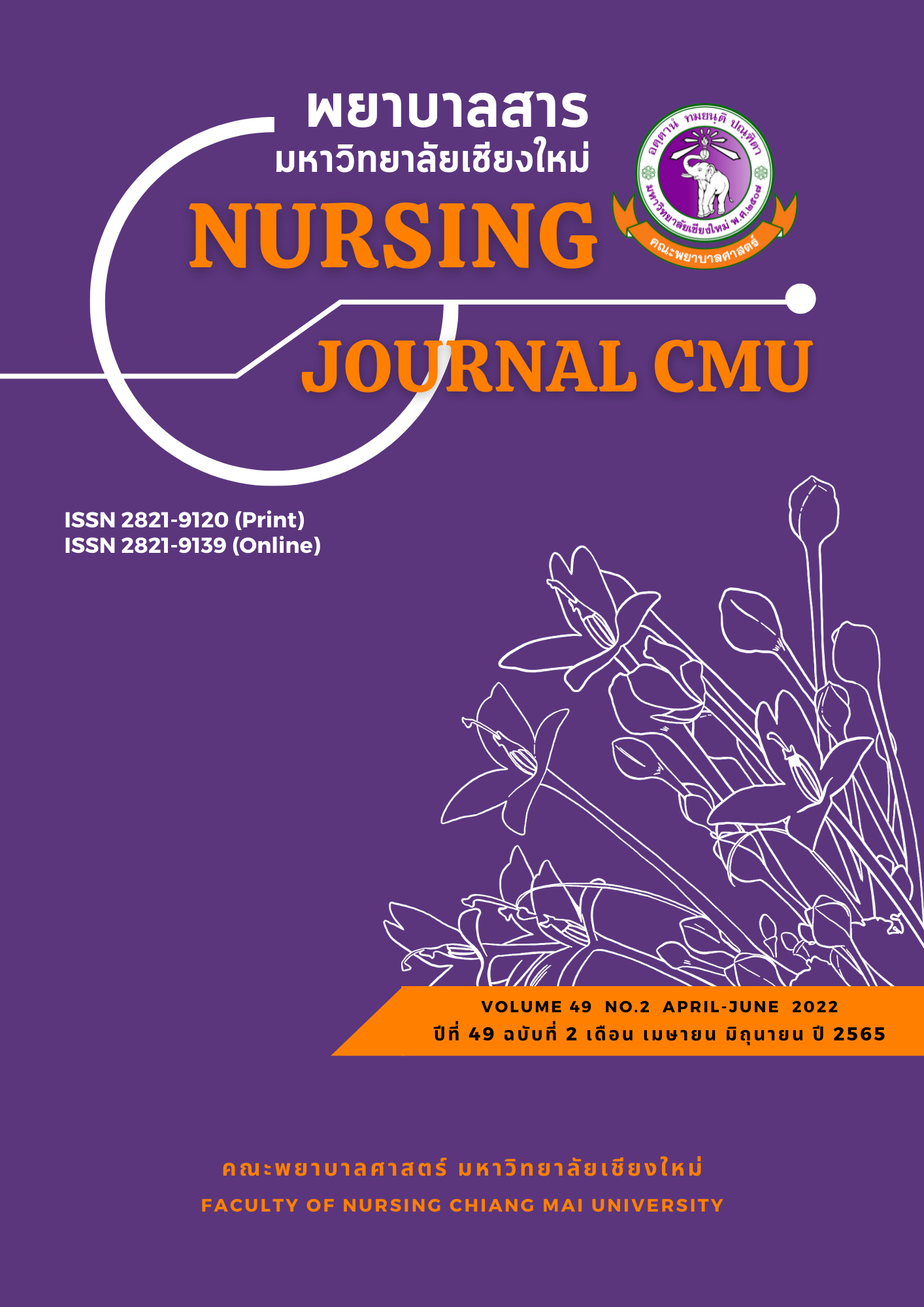The Effect of a Medication Adherence Promotion Program through the Line Application on Older Persons with Essential Hypertension
Keywords:
Medication adherence, Older person, Essential hypertension, LINE applicationAbstract
This experimental research aimed to study the effect of a medication adherence promotion program through the LINE application on older persons with essential hypertension. The sample was comprised of 56 older persons with essential hypertension aged 60 years and over. Samples were obtained according to the inclusion criteria and were randomly assigned by block randomization into an experimental group and a control group of 28 participants. The experimental group received routine care and the medication adherence promotion program based on the health belief model framework developed by Rosenstock et al. (1988). The program contained 1) reinforcing of individual beliefs by providing educational video media through the LINE application and presenting a healthy role model; and 2) providing stimulus or cue to action by sending reminder messages and following up via the LINE application. This program was conducted over a period of six weeks. The control group received only routine care. The Mann-Whitney U test and Wilcoxon Signed-Rank test statistics were used for data analysis.
The study findings revealed that, after participating in the program, the experimental group experienced an improvement in the mean medication adherence score with statistical significance (p < .001), and the mean medication adherence score in the experimental group was better than that in the control group with statistical significance (p < .01).
This study found that the medication adherence promotion program through the LINE application increased the medication adherence of older persons. Thus, the program should be implemented with older persons to promote consistent medication adherence for improved treatment effectiveness.
References
Adulyathum, T. (2020). Cloud meeting-telemedicine with medical personnel in the age of COVID-19. Journal of the Department of Medical Services, 45(2), 5–7. (in Thai)
Aekplakorn, W. (2021). Thai national health examination survey, NHES VI Year 2019-2020. Bangkok: Aksorn graphic and design. (in Thai)
Al-Noumani, H., Wu, J. R., Barksdale, D., Sherwood, G., Alkhasawneh, E., & Knafl, G. (2019). Health beliefs and medication adherence in patients with hypertension: A systematic review of quantitative studies. Patient Education and Counseling, 102(6), 1045-1056.
Aronow, W. S. (2020). Managing hypertension in the elderly: What’s new? American Journal of Preventive Cardiology, 1, 100001.
Athiyah, U., Subarniati, R., & Yuda, A. (2017). Medication adherence in elderly patients with hypertension. Asian Journal of Pharmaceutical and Clinical Research, 10(8), 165-170.
Burnier, M., & Egan, B. M. (2019). Adherence in hypertension: A review of prevalence, risk factors, impact, and management. Circulation Research, 124(7), 1124-1140.
Chang, T. E., Ritchey, M. D., Park, S., Chang, A., Odom, E. C., Durthaler, J., ... Loustalot, F. (2019). National rates of nonadherence to antihypertensive medications among insured adults with hypertension, 2015. Hypertension, 74(6), 1324-1332.
Kheokao, J., Ubolwan, K., Tipkanjanaraykha, K., & Plodpluang, U. (2019). Online health information seeking behaviors among the Thai elderly social media users. TLA Research Journal, 12(1), 60-76.
Kim, M. T., Hill, M. N., Bone, L. R., & Levine, D. M. (2000). Development and testing of the hill-bone compliance to high blood pressure therapy scale. Progress in Cardiovascular Nursing, 15(3), 90-96.
Kumpiriyapong, N., & Sasat, S. (2017). The effect of health belief programme on medicine used behavior in older persons with hypertension. Royal Thai Navy Medical Journal, 44(3), 67-83. (in Thai)
Manjavong, M., Limpawattana, P., Tiabrat, V., Jirawat, N., Khamniyom, S., Wannawichate, T., & Sawanyawisuth, K. (2021). Health outcomes of medication nonadherence among older adults with chronic illnesses at an outpatient clinic of a tertiary care hospital in Thailand. Journal of the Medical Association of Thailand, 104(Suppl. 4), S104-110.
Poulter, N. R., Borghi, C., Parati, G., Pathak, A., Toli, D., Williams, B., & Schmieder, R. E. (2020). Medication adherence in hypertension. Journal of Hypertension, 38(4), 579-587.
Rosenstock, I. M., Strecher, V. J., & Becker, M. H. (1988). Social learning theory and the health belief model. Health Education Quarterly, 15(2), 175-183.
Saendaeng, N., & Potisupsuk, C. (2018). Effect of drug use behaviors promotion program in elderly patients with non-communicable diseases Khemarat District, Ubonratchatani Province. Journal of Nursing and Health Care, 36(3), 33-41. (in Thai)
Sartori, A. C., Rodrigues Lucena, T. F., Takáo Lopes, C., Picinin Bernuci, M., & Yamaguchi, M. U. (2020). Educational intervention using WhatsApp on medication adherence in hypertension and diabetes patients: A randomized clinical trial. Telemedicine and e-Health, 26(12), 1526-1532.
Sun, Y. Q., Jia, Y. P., Lv, J. Y., & Ma, G. J. (2020). The clinical effects of a new management mode for hypertensive patients: A randomized controlled trial. Cardiovascular Diagnosis and Therapy, 10(6), 1805-1815.
Tanukaew, D. (2020). Factors predicting medication adherence in patients with essential hypertension (Unpublished master’s thesis). Mahidol University, Thailand. (in Thai)
Thai Society of Gerontology and Geriatric Medicine. (2020). A guideline to care for older persons during the COVID-19 pandemics. Journal of Gerontology and Geriatric Medicine, 19(1), 5-8. (in Thai)
Train The Brain Forum Committee. (1993). Thai Mental State Examination (TMSE). Siriraj Hospital Gazette, 45(6), 359-374. (in Thai)
Wan, L. H., Zhang, X. P., You, L. M., Ruan, H. F., & Chen, S. X. (2018). The efficacy of a comprehensive reminder system to improve health behaviors and blood pressure control in hypertensive ischemic stroke patients: A randomized controlled trial. Journal of Cardiovascular Nursing, 33(6), 509-517.
WHO. (2020). Fact sheets: Hypertension. Retrieved from https://www.who.int/news-room/fact-sheets/detail/hypertension
Yang, Q., Chang, A., Ritchey, M. D., & Loustalot, F. (2017). Antihypertensive medication adherence and risk of cardiovascular disease among older adults: A population-based cohort study. Journal of the American Heart Association, 6(6), e006056.
Yazdanpanah, Y., Saleh Moghadam, A. R., Mazlom, S. R., Haji Ali Beigloo, R., & Mohajer, S. (2019). Effect of an educational program based on health belief model on medication adherence in elderly patients with hypertension. Evidence Based Care, 9(1), 52-62.
Downloads
Published
How to Cite
Issue
Section
License
Copyright (c) 2022 Nursing Journal

This work is licensed under a Creative Commons Attribution-NonCommercial-NoDerivatives 4.0 International License.
บทความที่ได้รับการตีพิมพ์เป็นลิขสิทธิ์ของวารสารพยาบาลสาร
ข้อความที่ปรากฏในบทความแต่ละเรื่องในวารสารวิชาการเล่มนี้เป็นความคิดเห็นส่วนตัวของผู้เขียนแต่ละท่านไม่เกี่ยวข้องกับมหาวิทยาลัยเชียงใหม่ และคณาจารย์ท่านอื่นๆในมหาวิทยาลัยฯ แต่อย่างใด ความรับผิดชอบองค์ประกอบทั้งหมดของบทความแต่ละเรื่องเป็นของผู้เขียนแต่ละท่าน หากมีความผิดพลาดใด ๆ ผู้เขียนแต่ละท่านจะรับผิดชอบบทความของตนเองแต่ผู้เดียว






